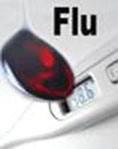- Could Your Grocery Store Meat Be Causing Recurring UTIs?
- Are You Making This Expensive Thermostat Error This Winter?
- Recognizing the Signs of Hypothyroidism
- 10 Strategies to Overcome Insomnia
- Could Artificial Sweeteners Be Aging the Brain Faster?
- Techniques for Soothing Your Nervous System
- Does the Water in Your House Smell Funny? Here’s Why
- Can a Daily Dose of Apple Cider Vinegar Actually Aid Weight Loss?
- 6 Health Beverages That Can Actually Spike Your Blood Sugar
- Treatment Options for Social Anxiety Disorder
Flu Season Off to a Slow Start … for Now


This year’s flu season is off to a slow but detectable start. And it appears to be a typical one that’s likely to peak in January or February, a leading U.S. health official says.
“We are starting to see a little more flu in the country, but we are still at pretty low levels,” said Dr. Joseph Bresee, chief of the U.S. Centers for Disease Control and Prevention’s Epidemiology and Prevention Branch in the Influenza Division.
“There is a little more each week, but still no widespread flu,” he added.
Bresee said that for the last two years, the flu season started early, peaking in December. “This year looks more like a classic flu year, where we are starting to see increasing cases of flu all around the country,” he said.
Despite the slow start, now’s the time to get a flu shot — if you haven’t already, Bresee said. It’s too early to tell which flu strains will predominate this season. But so far, the strains being detected seem to be a good match for the vaccine, he said.
It takes about two weeks for the vaccine to become effective, Bresee said.
More than 135 million doses of vaccine are available this year, according to the CDC.
This year’s vaccine is the same as last year’s, Bresee said, but that doesn’t mean that protection from a flu shot last year is still working.
“You need another shot every year whether the flu vaccine changes or not, because the flu antibodies you got last year with the vaccine decrease over time. And by now, you have low levels of these antibodies. So you want another vaccination to boost those antibodies,” he explained.
The CDC recommends that everybody 6 months of age and older get vaccinated. There are several forms of flu vaccine available, including injections, nasal spray and a high-dose injection for people 65 and older.
The CDC doesn’t recommend one form over another, Bresee said. “At CDC, we really don’t care. We just want everybody to get the vaccine, whether it’s the high dose or the standard dose,” Bresee said.
The nasal vaccine, however, is recommended for children 2 to 8 years old, he said. “But if a kid shows up at a doctor’s office and they don’t have the nasal vaccine in stock, go ahead and get the shot,” he added.
Infectious-disease expert Dr. Marc Siegel said a “recent study shows better effects of the flu vaccine than previously realized.”
Siegel, an associate professor of medicine at NYU Langone Medical Center in New York City, said that the 2009 pandemic H1N1 flu has been a prevailing strain the last few years, and it causes more severe illness in some children and pregnant women.
“Flu causes complications in the very young, the very old, pregnant women and those with chronic illness, including asthma, diabetes, heart disease and HIV,” he said.
It’s thought that, on average, from 5 percent to 20 percent of Americans come down with the flu each season, and more than 200,000 people are hospitalized with complications from the disease. From 1976 to 2006, estimates of flu-associated deaths in the United States ranged from a low of about 3,000 to a high of about 49,000 people, according to the CDC.
More information
To learn more about the flu, visit the U.S. Centers for Disease Control and Prevention.
Source: HealthDay
Copyright © 2026 HealthDay. All rights reserved.










